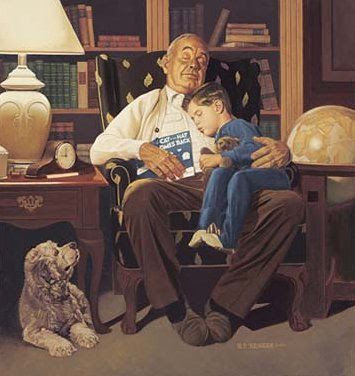Do you
remember an elderly person opening a dusty book and reading you a bedtime
story? With a small bedside light the story was at a slow pace full of sounds
and voices and make-believe as you snuggled under piles of blankets. Sometimes
the story was stopped and accented by remarkable tales not printed.
No book you
sit down with to read can compare to being read to. Reading a story by yourself
means you have to use your own experiences and imagination to visualize the
characters, but the spoken voice inflections point your thoughts into new
realms of wonder. Like an old radio series that held our breathless attention
for hours, pirates have a certain voice and cowboys have a certain sound and
you held on tight during a car chase.
When there is
no book or reader we have several options. We can lose ourselves in the mass of
the macabre called media or close our eyes to be engulfed in music that is just
another form of reading black dots. Another option is to sit face-to-face with
another human being and tell each other stories.
For telling
stories is how we communicate. All the plays and books (even that technical
stuff) and movies and television (even the commercials) are just stories. Tall
tales or factual historical documentaries, everyone has a story.
Meeting a new
person is to find out their story. Once you get passed the labels and become
interested enough due to their presentation, you ask to hear their story. Each
one is different and though maybe some cross referencing, like a
fingerprint is unique to only one.
Some say the
10 best ways to ‘write’ a story is:
1.
Write In
One Sitting


1 comment:
Three favorite volumes of stories:
Winesburg, Ohio
Dubliners
In Our Time
...or anything told in visual form by Mr. Hitchcock.
Post a Comment